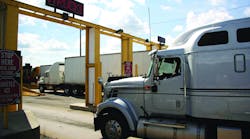Carriers trucking goods into Canada who get ticketed for failing to comply with the country's eManifest import pre-arrival data system will face fines as of Monday, Jan. 11. As a last compliance stage for highway carriers, this adds teeth to the tickets Canada Border Services agents began issuing July 10 last year.
"This is the end cap being put on a program that's taken several years to reach this point, and it does close off the highway portion" of compliance staging, says Glenn Palanacki, product manager for North American Customs at transportation data and logistics firm Descartes Systems Group.
Canada's eManifest system, designed to collect pre-entry data on commercial goods being imported to improve security and monitoring, began use with highway carriers back in 2011. Air, sea and rail carriers all have their own filing requirements for advance data on import goods.
"Highway carriers do need to know that this is going to start costing you as of Monday if you're not compliant," Palanacki notes. "The folks that aren't ready, maybe they don't have lanes into Canada or are just starting up new lanes, or really just aren't educated on it.
"But if they show up at the border now [unprepared], it isn't just a slap on the wrist" for noncompliance with eManifest, he explains. "It's $250 or it can go all the way up to $10,000, depending on the penalty."
From the Descartes team are these five points on eManifest:
1. Educate. Ensure drivers are knowledgeable on eManifest procedures and why they matter. Drivers should know eManifest is enforceable at all commercial ports across Canada, and noncompliance could lead to delays and now fines as well. Noncompliance could mean the necessary information is not provided or is incomplete, or didn't get transmitted to the Canada Border Services Agency (CBSA) within the required one-hour-beforehand time frame for highway carriers.
Descartes Systems notes that an advance electronic filing is temporarily not required for empty loads or in-transit shipments, but this will change in the future. "You need to know what this program is about," Palanacki says, suggesting that carriers check out Descartes' white paper on eManifest.
2. Enroll. If a carrier isn't set up with a carrier code for using eManifest, the carrier must register with the Canada Border Services Agency to obtain a carrier code and set up a "shared secret" with the agency for account verification.
Portions of these first steps involve manual paperwork that's mailed in, so if you haven't already enrolled or provided any additional information that was requested, don't delay, Descartes Systems advises.
3. Partner. A number of carriers have partnered with a technology service provider regarding the eManifest process for their businesses. Descartes Systems — which provides such services — notes that some eManifest scenarios "are still being refined as the regulation matures."
Because of that, a technology partner can help a carrier minimize potential penalties and assist with recordkeeping requirements, according to Descartes.
4. Set procedures. "You know you're going to Canada, but who's going to file? Is this something you're going to farm out? Set up your internal procedures," Palanacki says. Know what to do and who's responsible.
Traditional flow-charts, phone/text/email trees can improve communication, the Descartes team points out. Process manuals should include multiple driver types, such as a chapter for drivers registered with Canada's Customs Self-Assessment (CSA) program. It's also important to provide this information in a digital, mobile-ready format.
5. Optimize. Descartes suggests that carriers should look beyond the regulatory requirements. "This is saying, 'Well, I've done a thousand of these. How well have I done them?' You can add things like reporting and analytics," Palanacki notes.
"It's not just doing it, but doing it better," he adds. Technology and analytics can help carriers improve their overall efficiency, productivity and compliance rates and gain a competitive advantage, according to Descartes.
With the arrival of the Jan. 11 deadline, Palanacki notes that the initial tickets handed out since July 2015 for eManifest noncompliance — which again, up to this point, didn't carry fines — have numbered "in the hundreds." So it's not a huge number of violations going on with eManifest, and in part, that's because the Canadian government and stakeholders involved have done a good job getting the word out, he contends.
"This program was definitely delayed and there was enough education on it that Monday should not be a disaster at all," Palanacki tells Fleet Owner. "The bigger guys are probably well-prepared and have been doing this.
"Some of the smaller folks maybe haven't — maybe they've been doing whatever they're doing, and as of Monday they're going to have to change that or face cash fines," he says.



